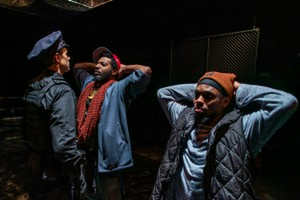Review: PASS OVER: Poetic, Profane, and Powerful Drama of Search for a Promised Land

Pass Over
Written by Antoinette Nwandu, Directed by Monica White Ndounou; Scenic Design, Baron E. Pugh; Costume Design, Chelsea Kerl; Lighting Design, Kathy A. Perkins; Sound Design, Anna Drummond; Production Stage Manager, John Meredith; Assistant Stage Manager, Kiara Escalera; Dramaturg, Pascale Florestal; Movement Coach, Mila Thigpen; Fight Choreographer, Brandon G. Green
CAST (in order of appearance): Kadahj Bennett, Hubens "Bobby" Cius, Lewis D. Wheeler
Performances extended through February 2 at SpeakEasy Stage Company, Roberts Studio Theatre in the Calderwood Pavilion, Boston Center for the Arts, 527 Tremont Street, Boston, MA; Box Office 617-933-8600 or www.SpeakEasyStage.com
"Write what you know" is a good piece of advice attributed to Mark Twain. Award-winning playwright Antoinette Nwandu knows what she's writing about in Pass Over, now receiving its New England premiere at the SpeakEasy Stage Company, in a co-production with The Front Porch Arts Collective. In this intense drama performed without intermission, two young Black men represent the lives of countless others like them who have dreams of reaching a promised land that is too often unattainable in these United States. With influences from Waiting for Godot and the Old Testament saga of Exodus, and inspired partly by the killing of Trayvon Martin, Pass Over is a haunting treatment of the present day state of affairs that proves discomfiting and cathartic on many levels.
To underscore exactly what is happening in the Roberts Studio Theatre, SpeakEasy Stage offers the following:
CONTENT ADVISORY: This production of Pass Over contains depictions of anti-Black racism, police harassment and brutality, strong language, and frequent use of the n-word (both as an expression between two black friends and as a racial epithet used by a white person.)
What is also happening is a trio of vivid performances by Kadahj Bennett (Moses), Hubens "Bobby" Cius (Kitch), and Lewis D. Wheeler (Mister/Ossifer) that are stunningly authentic. Bennett and Cius are the buddies hanging out under the streetlamp, night after night, fantasizing about leaving this block one day to escape the fate that has befallen too many of their friends, including Moses' brother. They don't have much, but they have each other's backs and a shared history. They banter in rhythmic vernacular that may be unfamiliar to a predominantly white audience, but Nwandu's gift is to immerse us in the language that is organic to her characters and let us feel their story by osmosis and observation. It is a credit to the actors' skills that we rely less on their words and more on their body language and facial expressions to understand their experience, to read when their feelings of foreboding are a false alarm or precede genuine danger.
There is no difficulty in deciphering the intentions of Wheeler's characters: the interloper (Mister) to the neighborhood who bends over backwards not to offend, while offering a buffet of food from his picnic basket, and Ossifer, the bullying, storm trooper-like po-po (police man) who demeans and threatens the young men with a nasty air of entitlement and superiority. Wheeler shows the breadth of his range as he toggles between the two, aided in his characterizations by the distinctly different costumes provided by designer Chelsea Kerl. Mister wears an off-white, three-piece suit appropriate for going to church or out for a Sunday stroll, while Ossifer dresses all in black, from cargo pants and utility belt to his dark aviator glasses.
For this production, the Roberts Theatre is reconfigured with a center performance space (not elevated) surrounded by rows of bleacher seating on all four sides, resulting in members of the audience facing each other and seeing how others react to the play in real time. Director Monica White Ndounou opts to have Bennett and Cius playing around on the stage as the audience ambles in, giving the impression that we are entering their space, much like Mister wanders onto their turf. Other than an announcement that is made about turning off electronic devices, there is no curtain up sign that the play has begun; rather our attention naturally focuses on the young men's vigil under the streetlamp.
Baron E. Pugh's scenic design evokes a caged feeling with a low ceiling of sections of chain-link fencing, and Kathy A. Perkins' lighting design is orchestrated to raise or lower the level of foreboding. The accompanying silences and sound effects, designed by Anna Drummond, enhance the emotional atmosphere. Ndounou's blocking and the work of movement coach Mila Thigpen create an energy that is sometimes joyous, sometimes manic, and nearly always watchful. Eventually, the lighter moments give way to an insidious, amorphous air of inevitability.
Pass Over is primarily set in the now, but also in 1855, and also in the 13th century BCE. The time shifts imperceptibly, while the oppression is unwavering. As one of the friends says to the other, "next day, same s**t," and they keep waiting. However, the defining dramatic force, what truly gives the play its gravitas, is that Nwandu tells her story from the point of view of Moses and Kitch, a pair of ordinary young men reaching for their dreams. Theater may be at its best when it tackles cultural, historical, and social issues from the point of view of the people who are oppressed or victimized, who feel the impact of the events being portrayed. When they are represented, when their voices are heard, it elevates us all.
Photo credit: Nile Scott Studios (Lewis D. Wheeler, Kadahj Bennett, Hubens "Bobby" Cius)
Comments
.png)
|
.png)
|
Videos

